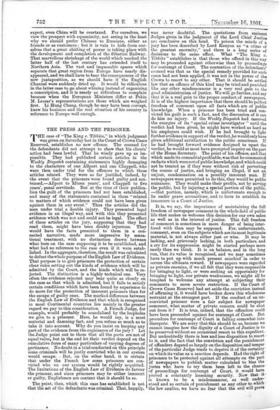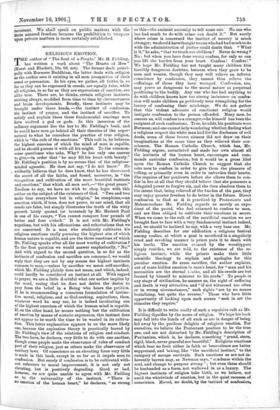THE PRESS AND HE PRISONER.
IHE case of "The King v. Tibbits," in which. judgment was given on Saturday last in the Court of Crown Cases &served, establishes no new offence. The counsel for the defendants did not attempt to show that his clients' action had been lawful. That he wisely gave up as im- possible. They had published certain articles in the We,ekly Dispatch containing statements highly damaging to the characters of one -.Allport and. one Chappell, who were then- under trial for the offences to which these articles related. They. were so far justified, indeed, by the event that the pnsoners. were found guilty and son- tenced,—Allport to :fifteen years', and Chappell to five years', penal servitude. But at the time of their publica- tion the guilt of the prisoners had not been established, and many of the statements contained in them " related to matters of which evidence could not have been given against them in any event." Thus the articles did the men under trial a double injury. They presented legal evidence in an illegal way, and with this they presented evidence which was not and could not be legal. The effect of .these articles on the jury, supposing that they had read them, might have been doubly injurious. They would have the facts presented to them in a con- nected narrative, made more impressive by sensa- tional treatment, with no distinction drawn between what bore on the case supposing it to be established, and what had no reference to the case' even if it were estab- lished. In the aggregate, therefore, the result was calculated to defeat thewhole purpose of the English Law of Evidence. That purpose-is to give prisoners the protection of certain clear rules setting out the kinds of evidence which will be admitted by the Court, and the kinds which will be re- jected. The distinction is a highly technical one. Very often the evidence rejected may bear quite as closely on the case as that which is admitted, but it fails to satisfy certain conditions which have been found by experience to do more for the protection of innocent prifsoners than for the escape of guilty ones. The marked dif erence between the English Law of Evidence and that which is recognised in most Continental countries lies mainly in the greater regard we pay to this consideration. A French Judge, for example, would probably be scandalised by the loopholes we give to a prisoner. Here, he would say, is a most material and damning fact, and you refuse so much' as to take it into account. Why do you insist on keeping any part of the evidence from the cognisance of the jury ? Let the Judgepoint out to them that all the parts are not of equal value, but in the end let their verdict depend on the cumulative force of many particulars of varying degrees of pertinence.' 'No doubt in a trial conducted on this principle some crithinals will be justly convicted who in our system would - escape.' . But, on the other hand, it is certain that under the French law some prisoners are con- victed . who on our 'system would be rightly acquitted. The limitations of the English Law of Evidence do favour the _prisoner, and since prisoners may be either innocent or guilty,'Englishmen are content that it should be so.
The point, then, which this case has established is not that the act of the defendants was criminal. That, happily. was never 'doubtfnl. The _ quotations from eminent Judges given- in the judgment of the Lord. Chief Judtiee are conclUsive on this head. To poison the minds of a, jury has been described by Lord Kenyon as " a crime of the greatest enormity," and there is a long series of decisions to the same effect. What " The King v. Tibbits " establishes is that those who offend in this way may be proceeded against otherwise than by proceedings for, contempt of Court. The contention of the defendants' counsel was that as the special remedy provided for such cases had not been applied, it was not in the power of the Crown to resort to any other. That it should be settled law that an offence of this kind may be tried and punished like any other misdemeanour is a very real gain to the good administration, of justice. We will go further, and say that it' is a real gain to the proper conduct of newspapers. It is of the highest importance that there should be perfect freedom of comment upon all facts which are of public knowledge. When a prisoner has been tried and con- victed his guilt is such a fact, and the discussion of it can do him no injury. If the Weekly Dispatch had reserved the energies of its " special crime investigator " until the verdict had been given, he might have worked as hard as his employers could wish. If he had brought to light further evidence in support of the verdict, he would onlyhave given additional satisfaction to the public conscience. If he had brought forward evidence designed to upset the verdict, he would at most have prompted inquiry on the part of the Home Secretary. The point of his offence, and that which made its committal profitable, was that he commented on facts which were not of public knowledge, and. which could not be treated as if they were without risk of perverting the course of justice, and bringing an illegal, if not an unjust, condemnation on a possibly innocent man. If newspapers were permitted to do this, they would be public nuisances. They would make their profits, not by serving. the public, but by injuring a special portion of the public, —that portion, namely, which is unfortunate enough to- lie under grave accusations, and to have to establish its innocence in a Court of Justice.
It is, we say, the importance of maintaining the full freedom of newspaper comment in the whole field of public life that makes us welcome this decision for our own sakes as well as in the interest of justice. This full freedom of comment is sometimes in more danger of being inter- fered with than may be supposed. For, unfortunately, comment, even on the subjects which are its most legitimate material, is not always either just or wise. It may be lacking, and grievously lacking, in both particulars, and a cry for its suppression might be started perhaps more easily than we think. It is on balance, and in the long run, that its value is recognised, and we may sometimes have to put up with much present mischief in order to secure the ultimate reward. If newspapers were regarded as private enemies, if we all felt that they were responsible for bringing to light, or were seeking an opportunity for bringing to light, our private weaknesses, we might all be tempted to welcome any attempt at subjecting their comments to more severe restriction. If the Court of Crown Cases Reserved had set aside the conviction instead of affirming it, it would have broken down this wholesome restraint at the strongest part. If the conduct of an un- convicted prisoner were a fair subject for newspaper comment, what matter of private concern could be shat out from it ? It is true, indeed, that the offenders could have been proceeded against for contempt of Court. But procedure for contempt of Court is falling somewhat into disrepute. We are sorry that this should be so, because we cannot imagine how the dignity of a Court of Justice is to be preserved without an occasional resort to this expedient. But undoubtedly there is less and.less disposition to resort to it, and the fact that the conviction and the punishment of offenders depend so largely on the disposition and temper of, the particular. Judge tends to deprive it of the certainty on which its value as a sanction depends. Had the right of prisoners to be protected against all attempts on the part of newspapers to publish matter calculated to bias the juries who have to try them been left to the chance of proceedings for contempt of Court, it would have proved a constantly lessening security. Now that it is known to be a misdemeanour, as well under- stood and as certain of punishment as anv other to which the law applies, we have no fear that the evil will prove
We shill speak on public matters with the tore assured freedom because the prehibition to trespass upon private matters is more certainly established.



























































 Previous page
Previous page